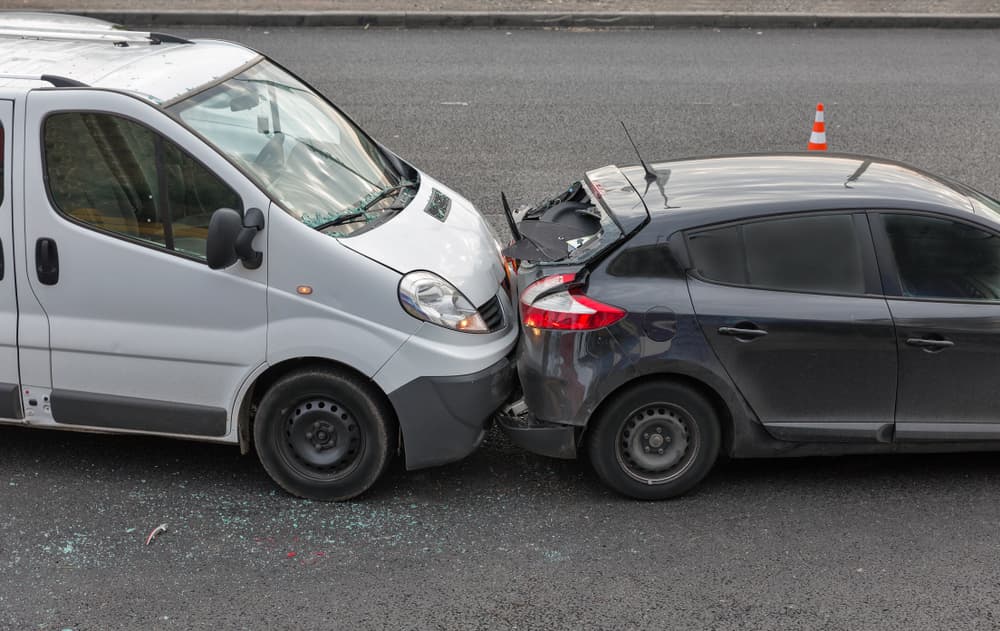Serious car crashes can lead not only to physical injuries but also to ongoing pain, suffering, inconvenience, and mental distress. The monetary compensation you may recover as part of a pain and suffering claim will depend on the nature and extent of your injuries, the medical treatment you underwent, and the likelihood that you may need to undergo treatment in the future.
If you recently suffered injuries in a car crash that occurred because of another driver's negligence, you must seek out legal help right away.
A skilled car accident attorney in your area can help you file a personal injury claim seeking compensation for pain and suffering. Your attorney can also help you negotiate a fair settlement offer from the insurance company.
If the insurance company refuses to offer you reasonable monetary damages, your lawyer can litigate your case at a jury trial or other litigation proceeding and help you obtain the pain and suffering compensation you deserve.
Schedule a Free Initial Consultation Today!
Car Accident Injuries That Lead to Ongoing Pain and Suffering
The injuries that car accident victims suffer depend significantly on the accident's circumstances, the type of accident that occurs, and the accident victim's bodily movements in their vehicle during the crash. When a driver or passenger's body moves abruptly back and forth – or from side to side, for example – they may suffer a whiplash injury to their neck or back.

Moreover, if a part of the accident victim's body strikes the steering wheel, window, door, or headrest in the crash, they may suffer a broken bone, rib fracture, or traumatic head and brain injury.
Other potential injuries that car crash victims may suffer include bruises from airbag deployment, internal bleeding, internal organ damage, spinal cord injuries, paralysis injuries, and death.
In addition to the injuries themselves, many accident victims experience ongoing symptoms, sometimes for the rest of their lives. Fortunately, these intangible losses are compensable as part of a car accident claim or personal injury lawsuit.
To help you increase the pain and suffering compensation you receive for your injuries:
- Follow through with a recommended medical treatment regimen, which may include consulting with your primary care doctor, attending medical appointments, consulting with a physical therapist, or undergoing surgery or other medical procedure.
- Speak with an experienced attorney who can help you obtain the documentation necessary to prove your case, including your treatment medical records and medical bills.
While you focus on obtaining the medical care and treatment you need after your auto accident, your lawyer can assemble a settlement demand package on your behalf.
After you complete your treatment, your lawyer can present a settlement demand package to the insurance company and start negotiating settlement compensation in your case.
How do Car Crashes Happen?
Area auto accidents usually happen when other drivers act carelessly and recklessly under the circumstances. For example, a driver might fail to follow one or more traffic laws, exhibit road rage, engage in distracted driving, or drive under the influence of alcohol or drugs.
First, many accidents happen when drivers deviate from the prevailing standard of care. In other words, they may violate one or more traffic laws, such as speeding, failing to use their mirrors, failing to use turn signals when switching lanes or making turns, and failing to yield the right-of-way to other vehicles – especially in traffic intersections.
When drivers do not follow traffic laws, they may cause car accidents, severe injuries, and other losses.
At other times, motor vehicle crashes happen when drivers exhibit the various characteristics of road rage.
Road rage refers to aggressive driving maneuvers that many drivers execute when they are in a hurry and attempting to get ahead of other traffic. Angry drivers often resort to horn honking, tailgating, and weaving in and out of heavy traffic, usually without using a turn signal.
Angry drivers may also cut other drivers off at highway merge lanes or engage in careless and reckless driving maneuvers. Unfortunately, these reckless maneuvers frequently lead to severe collisions, which may involve numerous vehicles.
Similarly, auto accidents frequently happen when drivers become distracted at the wheel. Instead of observing the road, a driver might be texting on a cellular phone or tablet, making a phone call without using a hands-free Bluetooth device, adjusting the volume on their radio, or programming a GPS navigation system. Sometimes, disciplining young children in the backseat or roughhousing with vehicle passengers may distract a driver.
Any of these activities may turn a driver's attention away from the road and prevent them from seeing an approaching automobile or pedestrian nearby.
Finally, many auto accidents result from drug and alcohol intoxication. Despite the known dangers of drinking and driving, many drivers still choose to get behind the wheel of a car after having too much to drink.
Alcohol is a depressant that significantly affects a driver's brain functioning and their ability to drive safely. Drunk drivers may also experience blurred vision, slowed reflexes, delayed reaction time, and other physical and mental symptoms. Consequently, an intoxicated driver may be unable to hit the brakes on their vehicle in time to avoid a severe crash.
When drivers exhibit these types of negligence, they are far more likely than careful drivers to cause a severe crash.
Some of the most common accidents that occur when drivers deviate from the standard of care include:
- Head-on collisions, where the front of one vehicle hits the front of an oncoming car that is traveling in the opposite direction
- T-bone or broadside accidents, where one vehicle hits the side panel of a car traveling on an intersecting road
- Sideswipe accidents, where the sides of two vehicles hit one another, sometimes pushing the car on the receiving end off the road entirely or into another lane of travel
- Rear-end accidents, where one vehicle hits the back of another car, usually because of excessive speeding or driver distraction.
If you suffered injuries in one of these types of automobile accidents that resulted from another driver's careless behavior, it is essential to remember that you are not alone.
As soon as you retain legal counsel to represent you in your case, your attorney can investigate your accident circumstances, gather information from witnesses, obtain copies of police reports, and file a claim on your behalf. They can then pursue the monetary recovery you deserve, including compensation for your physical pain, suffering, and inconvenience.
Potential Monetary Damages in a Car Crash Case
Injured car crash victims may be eligible to receive monetary damages for both their tangible and intangible losses. Specifically, economic damages compensate accident victims for their out-of-pocket costs, medical expenses, lost earnings (if they had to miss time from work), and loss of earning capacity (if they had to take on a lower-paying job due to their injuries).
In addition to these economic damages, however, accident victims may recover compensation for their intangible losses.
Non-economic damages compensate accident victims for all of their:
- Inconvenience
- Mental anguish
- Pain and suffering
- Humiliation
- Loss of life enjoyment
- Loss of the ability to use a body part
- Permanent disability
- Permanent disfigurement
- Loss of spousal companionship and consortium
The amount of money an accident victim can recover for their pain, suffering, and other intangible losses will vary from case to case. A favorable settlement offer from an insurance company adjuster should compensate you for your financial losses and your past and anticipated pain and suffering.
Moreover, a fair jury verdict or binding arbitration result should compensate you for the pain and suffering you endured – and likely will endure going forward.
Some of the most common factors that may affect the pain and suffering award you receive in your case include:
- The extent of hardships you experienced in your life as a result of the injuries you suffered in your accident
- Whether your activity levels significantly decreased due to the injuries you sustained in your accident
- Whether you can perform the same types of social, recreational, and work activities after your accident as you did before your accident
- How you may experience symptoms going forward, such as if you suffered one or more permanent injuries in your accident
- How a judge or jury considers the evidence you present in your case
- The specific insurance company/adjuster with whom you are dealing – and their ability to be sympathetic to your claimed pain, suffering, and inconvenience
- Whether a medical provider has determined that you suffered a permanent injury in your accident and that you are likely to experience pain and other symptoms well into the future
- Whether your pain and other symptoms affect your ability to make a living
- The specific venue where your auto accident case is pending and whether or not potential jurors in that venue tend to be plaintiff-friendly and sympathetic to accident victims.
A knowledgeable auto accident attorney in your area can highlight the strengths of your case while downplaying any weaknesses to increase the pain and suffering compensation you recover for your injuries.
Negotiating Settlement Fair Settlement Compensation for Pain and Suffering
The first step to recovering fair monetary compensation for pain and suffering, as well as for your tangible losses, is for your attorney to submit a settlement demand package to the insurance company adjuster handling your claim.
That demand package may include:
- A settlement demand letter that makes a demand for monetary compensation within the at-fault driver's insurance policy limits
- Copies of the police report that depict the accident scene, explain how the accident occurred, and indicate whether the responding police officer issued the at-fault driver a traffic citation
- Photographs of your visible injuries
- Photographs of property damage to the involved vehicles
- Copies of all of your medical treatment records and bills
After your attorney obtains copies of these documents, they can forward the documents to the insurance company and begin negotiating a settlement on your behalf. After several rounds of negotiations, if the insurance company still has not increased its offer, your lawyer can file a lawsuit in court and pursue the monetary recovery you deserve for both your tangible and intangible losses.
During the litigation stage of an auto accident case, the parties will usually:
- Participate in discovery, including answering written Interrogatories and attending depositions
- Attending one or more settlement conferences with the court
- Attending a jury trial or other litigation proceeding
Auto accident cases typically proceed to a jury trial when the parties cannot resolve all of the issues in the case, including the amount of monetary compensation to award the accident victim. Insurance companies often try to offer as little compensation as possible for pain and suffering. Therefore, a jury may need to decide that issue at trial.
Instead of taking your auto accident case to a jury trial, you can pursue alternative dispute resolution (ADR), such as mediation or binding arbitration. Your attorney can help you decide the best route to take in your case to recover the highest amount of monetary compensation possible.
Contact a Car Accident Attorney Right Away

If you recently suffered injuries in a car crash that was not your fault, you should contact a knowledgeable car accident lawyer as quickly as possible. Accident victims only have two years from the date of their accident to seek monetary recovery for their injuries. Therefore, it is in your best interest to act quickly when seeking the legal representation you need.
A car accident lawyer will do everything they can to help you maximize the total compensation you receive in your case, including payment for all your suffering, pain, and inconvenience.
You cannot trust insurance companies, as they often minimize the value of your pain and suffering. You need to hire a personal injury attorney who has seen firsthand how injuries can bring pain and suffering. They can advocate for the damages you deserve.



